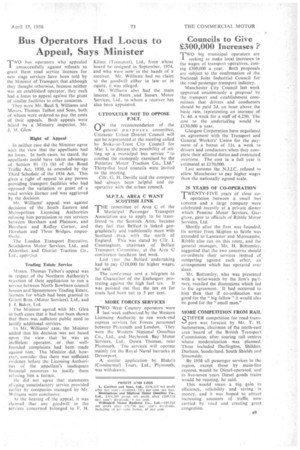Councils to Give £300,000 Increases ?
Page 43

If you've noticed an error in this article please click here to report it so we can fix it.
'TWO big municipal operators are 1. seeking to make local increases in the wages of transport operatives, costing £300,000 a year. Both proposals are subject to the confirmation of the National Joint Industrial Council for the road passenger transport industry.
Manchester City Council last week approved unanimously a proposal by the transport and establishment com mittees that drivers and conductors should be paid 2d. an hour above the basic rate, representing an increase of 7s. 4d. a week for a staff of 4,250. The cost to the undertaking would he £130,000 a year.
Glasgow Corporation have negotiated an agreement with the Transport and General Workers' Union for the pay ment of a bonus of Its, a week to drivers and conductors when they com plete their allotted duties and contracted overtime. The cost in a full year is estimated at £170,000. .
Last autumn the N.J.I.C. refused to allow Manchester to pay higher wages than the nationally agreed scale.
25 YEARS OF CO-OPERATION 'TWENTY-FIVE years of close co' operation between a small bus concern and a large company were celebrated recently at a private dinner which Pennine Motor Services, Gargrave, gave to officials of Ribble Motor Serviees, Ltd.
Shortly after the firm was founded, its service from Skipton to Settle was extended to Lancaster and Morecambe. Ribble also ran on this route, and the general manager, Mr. H. Bottomley, suggested that the two concerns should co-ordinate their services instead of competing against each other, an arrangement which has operated ever since.
Mr. Bottomley, who was presented with a wrist-watch by the firm's partners, recalled the discussions which led to the agreement. It had occurred to him then that if co-ordination was good for the "big fellow" it would also be good for the "small man."
MORE COMPETITION FROM RAIL
STIFFER competition for road transport was forecast by Mr. T. H. Surnmerson, chairman of the north-east area 'board of the British Transport Commission, after touring rail centres where modernization was planned. These included Darlington, Shildon, Durham, Sunderland, South Shields and Si non side.
By 1958 all passenger services in the region, except those by main-line express, would be' Diesel-operated, and in five-seven years Diesel goods trains would be running, he said.
This would mean a big gain in efficiency, reliability and saving in money, and it was hoped to attract increasing amounts of traffic now carried by road and creating great congestion.




















































































































